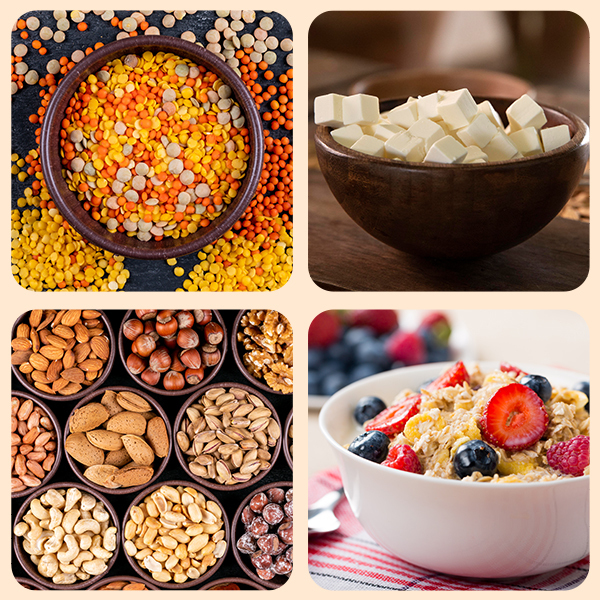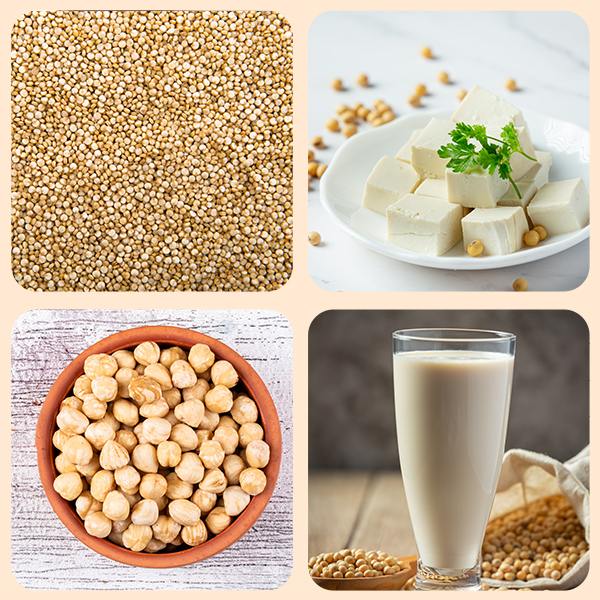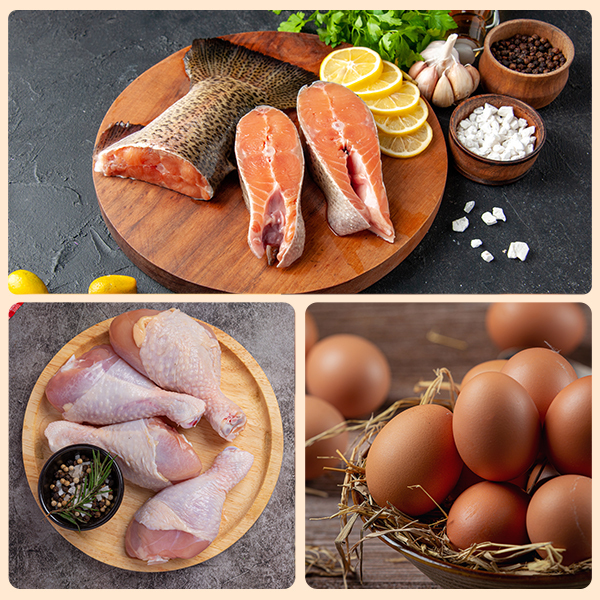Daily Recommended Amount of Protein You Should Know
Blogs30 Sep 2025
IN THIS ARTICLE
What is Protein?
Protein is a crucial macronutrient that forms the building blocks of muscles, organs, enzymes, and hormones in the human body. It plays a vital role in tissue repair, immune function, and energy production. Understanding your daily need of protein is essential for maintaining strength and supporting a healthy lifestyle, particularly as the body ages.
In this article, we’ll discuss the importance of protein for ageing adults, how counting protein intake works and, answer questions like, ‘How much protein do I need per day?’, and more.
Importance of Protein in Your Midlife for Maintaining Muscle Mass and Strength
Having a lower intake of protein and not exercising often enough can lead to weaker muscles. With age, older adults face natural muscle loss, which can reduce functional ability and strength. It can also impact the way we exercise. Having a low amount of protein can also mess with our muscle repair functions, impacting the strength and resilience of muscles, bones, and skin.
Science has found that completing your daily protein requirement, along with meeting the recommended fibre required per day and exercising regularly, can be beneficial for those in their midlife and beyond. It can support muscle repair and muscle building and give you many more years of an active and functional lifestyle!
How Much Protein Is Necessary Per Day?
The Recommended Dietary Allowance (RDA) for protein, as per the Indian Council of Medical Research (ICMR), is 54 g/day for men (with a body weight of 65 kgs) and 45.7 g/day for women (with a body weight of 55 kgs). This shows how many grams of protein per day you need based on your body weight. ICMR’s recommendation of how much protein to eat per day is 0.83 g/kg/day, which means that 0.83 times your body weight is your protein requirement per day.
Protein requirement per day can vary depending on factors such as age, weight, body composition, activity level, and overall health conditions. For example, if you’ve been on a diet for a very long time and have low muscle mass, then your daily protein requirement may be higher. Similarly, if you are physically active, your protein requirement per day will be higher than someone who is sedentary. You can consult with your doctor to confirm how much protein to consume per day and prioritise having it through your food!
How Much Protein is Too Much?
More than 2g/kg/day is considered to be a high amount of protein consumed per day. Having more protein than recommended may cause issues like nausea, dehydration, intestinal discomfort, fatigue, and headaches. It’s important to know your protein allowance per day to avoid overconsumption and maintain overall health.
A higher daily consumption of protein for a prolonged period can cause more serious issues like blood vessel disorders, liver and kidney issues, seizures, etc. Make sure you also check your daily need of protein based on your age, weight, and activity level.
Sources of Protein for People in the Age Group 40-60
For adults aged 40-60, including diverse protein sources is key. This helps meet the daily recommended amount of protein while supporting bone health, metabolism, and overall wellness. Here’s a table of common protein-rich foods and their approximate protein content:
| Protein Source | Protein per 100 g (grams) |
| Eggs | 13g |
| Greek Yogurt | 10g |
| Lean meat (chicken breast) | 21g |
| Fish (salmon) | 20g |
| Lentils | 24g |
| Chickpeas | 20g |
| Almonds | 21g |
| Cottage Cheese | 11g |
Including iron rich foods and energy boosting snacks alongside protein sources can further enhance your overall nutrition. Incorporating low calorie Indian food ensures your diet remains balanced and sustainable.

Some Protein Sources for Vegans
Tofu
Chickpeas
Quinoa
Soy Milk

Protein Sources for Non-Vegetarians
Lean meat
Eggs

Incorporating these in your meals can help you meet your protein requirement per day effectively.
How to Add More Protein into Your Diet
Include a protein source in every meal.
Eating the right amount helps meet your daily protein requirement for energy and muscle health.
Choose snacks rich in protein, like nuts and seeds, sprouts, boiled rajma, chickpea etc.
These snacks contribute to your protein intake per day, keeping you full and satisfied.
Use dairy products like milk and yoghurt, which are good protein sources.
Including them regularly ensures you are closer to your daily protein requirement.
Include lentils and legumes in your diet regularly.
These plant-based options also contribute to your daily required amount of protein, supporting digestion and overall health.
When Is the Best Time to Consume Protein?
The timing of protein intake can influence muscle synthesis and recovery. Consuming protein at each meal, especially after workouts or physical activity, helps optimise muscle repair. Spreading protein intake throughout the day ensures your body consistently receives the protein required per day for optimal health and energy.
Conclusion
Are you wondering how much protein I need per day? Understanding this is crucial for maintaining health, especially during midlife. Counting protein intake and ensuring that you're meeting your daily protein requirement is a key part of healthy ageing. Being aware of your protein intake and having it regularly all day can help you boost your muscle health and keep you active and functional for longer. Including brain boosting food alongside your protein sources can further enhance focus and cognitive health.
Remember, protein helps your body beyond just muscles. Tracking your protein per day and including it consistently throughout your meals can make a big difference in healthy ageing.
Curious how to start? Explore the articles on the Right Shift website to learn more about health, nutrition, and ageing. You can also use our free health score calculator to assess your health at present and figure out how much protein to consume per day for your goals. Then you can try our free meal plans that are customised according to your preferences and health goals to create a plan that works for you.
To make healthier eating easier, check out our nutritious offerings such as Millet Oats Upma Mix, Jaggery Oats Cookies, and Multigrain+ Atta, and explore more options at the Shift Shop. Start today and make the right shift towards healthier ageing!
Other Popular Blogs
High-Protein Foods | Protein-Rich Foods for Vegetarians | Protein for Ageing | Protein Foods for Muscle Gain | Proteins and Diabetes Management |
FAQs
Consuming too much protein can lead to headaches, dehydration, nausea, fatigue, intestinal discomfort etc. Prolonged overconsumption of protein can have more adverse effects and lead to kidney disorders, cardiovascular conditions, blood vessel disorders, and other complications. That’s why it’s important to know your daily recommended amount of protein and avoid exceeding your body’s needs.
There are tons of vegetarian and vegan food options to meet your daily protein requirements. If you’re unsure how much protein you should eat, including a variety of legumes like lentils, chickpeas, and black beans, whole grains like quinoa and brown rice, nuts and seeds, tofu and tempeh, vegetables like spinach and broccoli, and dairy products can help make your diet high in protein.
Our bodies don’t necessarily require more protein as we age. However, our natural ability to absorb more protein and other essential nutrients decreases. And more often than not, adults miss having their daily required amount of protein, both of which can cause issues in the body. That’s why it’s important to know how much protein to consume and stick to it consistently. If you’re in your 40s and beyond, check with a doctor and get started on your protein intake seriously!
To calculate your daily protein requirement, you can use the recommended dietary allowance (RDA) set by health authorities. ICMR says that the protein required per day is 0.83g/kg, which means that you simply need to multiply your weight by 0.83g to get your total protein intake per day.
The daily protein requirement varies depending on age, weight, activity level, and health goals. Generally, adults are advised to consume between 0.8–1.2 grams of protein per kilogram of body weight. For active adults or those seeking muscle maintenance, higher intake may be necessary. Tracking your protein intake per day helps ensure you meet your daily protein needs.
1. https://www.ncbi.nlm.nih.gov/pmc/articles/PMC5772850/
2. https://www.medicalnewstoday.com/articles/322825#when-to-avoid
3. https://www.nin.res.in/rdabook/brief_note.pdf
4. https://www.medicalnewstoday.com/articles/322825#summary
5. https://pubmed.ncbi.nlm.nih.gov/26797090/
6. https://pmc.ncbi.nlm.nih.gov/articles/PMC10580981/
7. https://pmc.ncbi.nlm.nih.gov/articles/PMC6766546/
8. https://www.ncbi.nlm.nih.gov/books/NBK594226/




